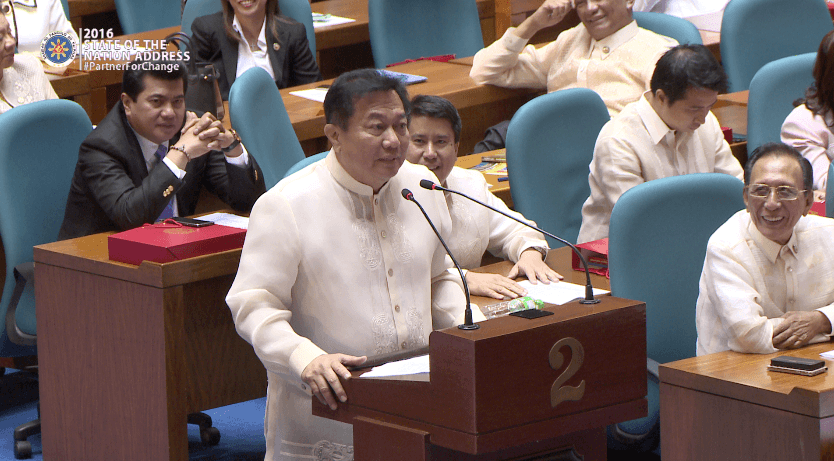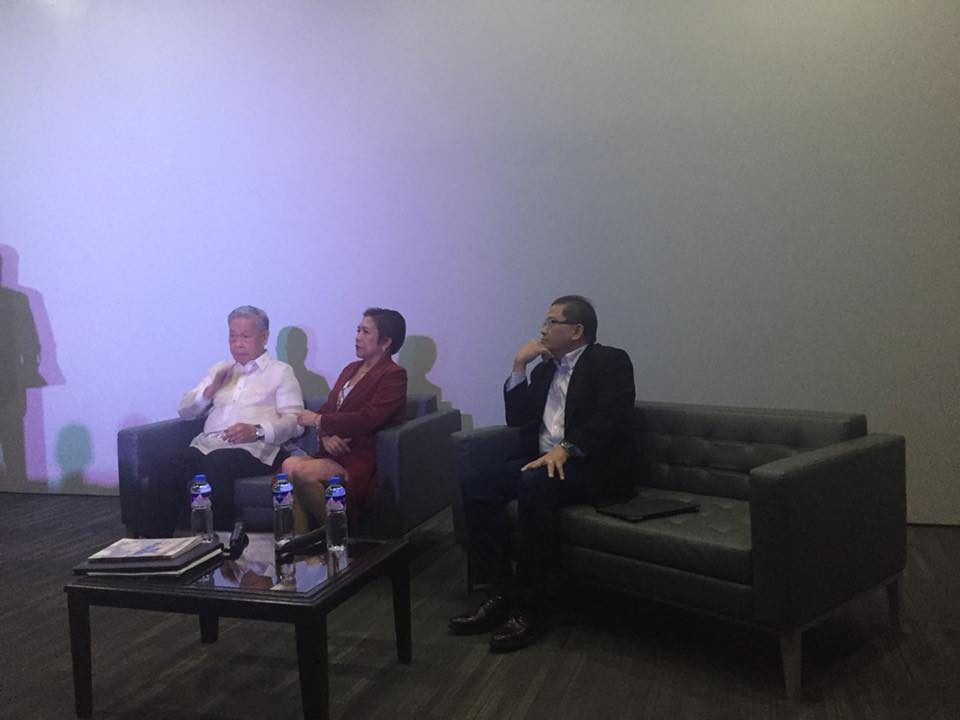SUMMARY
This is AI generated summarization, which may have errors. For context, always refer to the full article.

MANILA, Philippines – House Speaker Pantaleon Alvarez is strongly pushing for a Constitutional Assembly (Con-Ass) as a mode to implement Charter Change or Cha-Cha, but stakeholders said his flip-flopping has undermined his, and even the entire Congress’, credibility to amend the Constitution.
“Even Alvarez was asking for a Constitutional Convention (Con-Con), now suddenly he wants a Con-Ass? If at this time, we cannot even trust those who are proposing, then perhaps we have to begin trusting ourselves in fighting against it,” former Supreme Court chief justice Hilario Davide Jr said on Monday, February 26.
Davide spoke at the Charter Change forum held at the De La Salle University College of Law, where he once again expressed his strong opposition to Cha-Cha and federalism.
Philippine Daily Inquirer associate editor John Nery, among the speakers at the forum, said that the administration’s actions on Cha-Cha depend only on President Rodrigo Duterte’s “political fortunes”.
Alvarez is one shining example, according to Nery. (READ: Changing the Constitution: What are being proposed so far)
Con-Con vs Con-Ass
Nery pointed out that on Duterte’s first day in office on June 30, 2016, Alvarez filed a resolution calling for a Con-Con to propose revisions to the Constitution.
This was followed by similar resolutions filed on the same day by Duterte’s key allies like Deputy House Speaker Gwendolyn Garcia and Gloria Macapagal-Arroyo.
In his resolution, Alvarez said that a Con-Con is “not only the most participatory and democratic mode” but also a way to “dispel any doubt that it is being sought to advance the political and economic interests of a few.”

In a Con-Con, the public elects representatives who will propose amendments while in a Con-Ass, Congress convenes into a body that will draft the amendments.
But only a month after, President Rodrigo Duterte said a Con-Con would be too expensive and announced his push for a Con-Ass, after which Alvarez also changed his tune.
Nery noted that by yearend 2016, surveys showed Duterte had maintained high trust ratings. By February 2017, Alvarez had co-authored a resolution turning his back on Con-Con and calling instead for a Con-Ass. Garcia and Arroyo joined that resolution.
“A constituent assembly is the preferred mode of introducing amendments to the Constitution since it is deemed the most expeditious, open and least costly,” says House Concurrent Resolution No. 9, co-authored by Alvarez.
The resolution also said that the “clamor” for Cha-Cha has “not only been sustained but affirmed with the overwhelming victory of President Rodrigo Duterte, who stood on a platform for a shift from a unitary to a federal form of government.”
Vice President Leni Robredo said she prefers a Con-Con because the people would get to elect their representatives, while Duterte is of the view that the elected members of the Congress are already trusted by the public.
The Senate generally agrees with a Con-Ass, just as long as voting is done separately so that their vote of 23 will not be diluted by the House of Representatives’ vote of almost 300. Alvarez disagreed as he wants joint voting.
By mid-January, Alvarez announced that Con-Ass will push through with or without the Senate, and that members of the Upper House can just run to the Supreme Court.
“This is a different Alvarez now because they have completed the conquest of the Supreme Court, they have the pliable majority of at least 8 that will vote whichever they want,” Nery said.
Nery added: “This is a history of crass opportunism, they feel that they can get away with anything and they’re going to try their way.” (READ: Alvarez: ‘Con-Ass’ not in Charter, no need for Senate OK)
University of the East law professor Lyssa Grace Pagano pointed out that under the 1987 Constitution, Congress votes jointly only in the proclamation of martial law and the suspension of the privilege of the writ of habeas corpus.
“I find it absurd that some brilliant mind in the House said that they should just vote jointly. No,” Pagano said.
Is federalism the answer?
Pagano, who has gone around the country meeting local leaders to discuss Cha-Cha, said federalism is not the solution to the problems of the local government.
“If the only purpose of federalism is empower local governments, I see no need to amend the Constitution. An amendment to the local government code would suffice,” Pagano said.
Pagano echoed other experts’ fears that federalism will only give rise to political dynasties.
“If federalism is adopted and no corresponding economic development is achieved, and if political dynasties are not banned, patronage politics will continue, and the same families shall rule in some regional states,” Pagano said.
A student from the forum asked the speakers: If our system is broken now, shouldn’t we amend the Constitution to fix it?
Nery said that the student’s premise was based on a “force-fed” narrative.
“When someone says the system is broken, he means the MRT, or he means new taxes. I don’t think that there’s a majority of Ffilipinos who mean by that phrase that it’s time to change our Constitution. We are being force-fed this narrative by the people in power,” he said. – Rappler.com
Add a comment
How does this make you feel?
There are no comments yet. Add your comment to start the conversation.